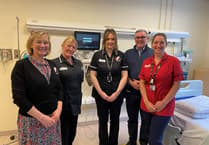Manx Care is encouraging island residents to familiarise themselves with their Minor Ailments Scheme (MAS).
MAS is operated through most of the island’s local community pharmacies, so that people can potentially receive faster access to treatment for a range of common conditions that they’d normally require a prescription for.
In recent months, there has been an increase in people seeking treatment for many of the conditions covered under MAS at GP surgeries, the Manx Emergency Doctor Service (MEDS), the Minor Injuries Unit (MIU) at Ramsey Cottage Hospital and the Emergency Department at Noble’s Hospital.
Manx Care believe this potentially may be because of a lack of awareness of the scheme and how local community pharmacies can support peoples’ health needs.
The conditions covered under the Minor Ailments Scheme include:
l Bacterial conjunctivitis
l Bacterial skin conditions/Impetigo
l Urinary Tract Infections (UTIs) - including cystitis
l Shingles
l Thrush (vaginal and oral)
l Hayfever
l Coughs
l Gout
l Toothache
l Constipation
l Nappy rash
l Exercise-related injuries
Prescriptions are free of charge for people who’d usually receive free prescriptions.
Not everyone will be eligible for treatment under the MAS, depending on their age or any pre-existing medical conditions they may have, so it’s worth calling ahead to check your local community pharmacist can offer you treatment under MAS before making your journey.
Manx Care’s chief pharmaceutical advisor, Maria Bell, said: ’Many Manx residents are already aware of the existence of the MAS and are using it successfully, meaning they’re getting fast access to treatment for a range of common conditions and reducing the likelihood that they’ll then need to go on and see their GP or another clinician, for example attend the Emergency Department at Noble’s.
’However, we know that there are a number of people who don’t know about MAS and how it can potentially help them - and we want to raise awareness with them.
’Community pharmacists train for a minimum of five years in the use of medicines and are trained in managing minor illnesses too - so they’re a great resource to help people.
’They can offer clinical advice and provide medication for a range of minor ailments and common conditions, as well as provide advice on how best to keep you and your family healthy and well.
’They’ll also signpost people to their GP if they’re in need of more specialist support.
’I’d encourage people to find out more about the Minor Ailments Scheme and consider using their local community pharmacy as their first port of call for health and wellbeing-related advice.’




